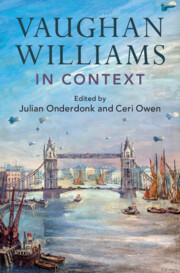Book contents
- Vaughan Williams in Context
- Composers in Context
- Vaughan Williams in Context
- Copyright page
- Dedication
- Contents
- Illustrations
- Graphs and Tables
- Musical Examples
- Notes on Contributors
- Acknowledgements
- Editorial Note
- Bibliographic Abbreviations
- Introduction
- Part I Biography, People, Places
- Part II Inspiration and Expression
- Part III Culture and Society
- Part IV Arts
- Chapter 19 Literature
- Chapter 20 Visual Art
- Chapter 21 Theatre, 1895–1914
- Chapter 22 Dance
- Chapter 23 Film
- Part V Institutions
- Part VI Reception
- Further Reading
- Index of Works
- General Index
Chapter 19 - Literature
from Part IV - Arts
Published online by Cambridge University Press: 28 March 2024
- Vaughan Williams in Context
- Composers in Context
- Vaughan Williams in Context
- Copyright page
- Dedication
- Contents
- Illustrations
- Graphs and Tables
- Musical Examples
- Notes on Contributors
- Acknowledgements
- Editorial Note
- Bibliographic Abbreviations
- Introduction
- Part I Biography, People, Places
- Part II Inspiration and Expression
- Part III Culture and Society
- Part IV Arts
- Chapter 19 Literature
- Chapter 20 Visual Art
- Chapter 21 Theatre, 1895–1914
- Chapter 22 Dance
- Chapter 23 Film
- Part V Institutions
- Part VI Reception
- Further Reading
- Index of Works
- General Index
Summary
Drawing upon their respective expertise in early twentieth-century literature and music, Matthew Ingleby and Ceri Owen explore the centrality of literature within Vaughan Williams’s work and career, demonstrating that his literariness was not simply an outgrowth of his personal artistic proclivities, but rather was mediated by several institutions that were key to the production of a new sense of English national identity during the first half of the twentieth century. By contextualizing Vaughan Williams’s literary tastes and choices for musical settings – including his interest in historically remote, non-contemporary, and Anglophone writers and texts – it is argued that such choices should be read less as evidence of the reactionary, conservative nationalism with which he has often been associated, and more as an indication of his participation in forward-looking currents within twentieth-century literary culture. Ingleby and Owen conclude by proposing that, while the nation may have been the frame through which Vaughan Williams often articulated a complex relation to modernity, his powerful interest in internationalist figures such as Walt Whitman and William Blake suggest that his cultural nationalism formed part of a broader humanitarian aspiration, one that was implicitly indebted to his literary imagination.
Keywords
- Type
- Chapter
- Information
- Vaughan Williams in Context , pp. 161 - 168Publisher: Cambridge University PressPrint publication year: 2024

